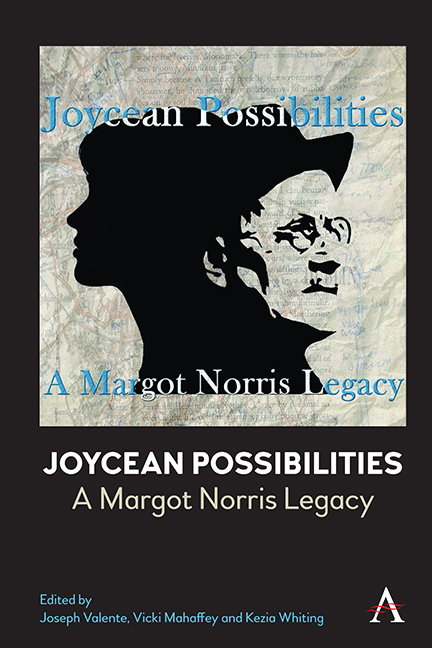15 - Finnegans Wake As Fictional World Refusal
Published online by Cambridge University Press: 20 April 2024
Summary
Few literary scholars have thought as restlessly or as generously as Margot Norris has about novels and the world. We might look at how her Joyce's Web (1992) torques its author's early deconstructivist reflexes toward feminist, historicist, and political accounts of Joyce. Or we could consider how Writing War in the Twentieth Century (2000) brings the ethical demand of action and intervention to bear on the scene of reading war novels, lighting up literature's capacity to shape “the ideological constructions that legitimate attitudes that inform public policy.” In both these books, and in many others, we find Norris wrestling fiction, alongside other modes and media, into different angles of engagement with the world. Her work's restlessness inheres in how often we find a given project rounding on, probing, and complicating the central impulses of those that precede it. Its generosity lies in the rich intellectual sustenance it sets before its readers and in the openings created by its internal twists and rotations—the pockets of air where new impulses and projects can get their start.
In the mid-2000s, Norris's work began to address world as a theoretical term by engaging with possible worlds theory, an interdisciplinary precipitate of philosophy-of-language and narratology that formed in the early 1990s. As possible worlds theorist Lubomír Doležel put it, this approach shifted attention from “narrative as story to narrative as fiction”—that is, from narrated events and their emplotted sequence to the ontologies of fictional worlds. Possible worlds theory places special emphasis on how a work of fiction may host many “non-actual” worlds (in the shape of characters’ plans, wishes, fantasies, etc.) while typically designating one world as “actual” within the fiction. Joyce's Ulysses offers a vividly illustrative example: even as it offers us multiple “non-actual” worlds (from characters’ daydreams and hallucinations to episode-long stylistic distortions), the novel implies the baseline existence of an “actual” June 16, 1904, which in turn differs ontologically from the historical June 16, 1904. Norris's possible worlds scholarship to date has been drawn primarily to this rich literary example, culminating in Virgin and Veteran Readings of “Ulysses” (2011), whose methodology is rooted in possible worlds theory. But in one essay, Norris has also brought possible worlds theory to bear on Finnegans Wake, whose liquidation of novelistic realism makes it an unlikely object for a theory grounded in the realist novel.
- Type
- Chapter
- Information
- Joycean PossibilitiesA Margot Norris Legacy, pp. 223 - 238Publisher: Anthem PressPrint publication year: 2022



